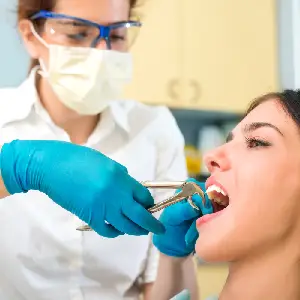If you’ve recently undergone a tooth extraction, you may have received various post-surgery instructions. One common recommendation is to avoid dairy products for a certain period after the procedure. While dairy is a staple in many diets due to its nutritional benefits, it can have adverse effects during the recovery phase after tooth extraction.
Let’s explore why no dairy after tooth extraction is a crucial part of your recovery and how dairy can affect healing, discomfort, and recovery time.

Why Avoid Dairy After Tooth Extraction?
After a tooth extraction, it’s important to be mindful of the foods and drinks you consume, especially dairy, as it can interfere with the healing process in several ways. Here’s why no dairy after tooth extraction is a big “Yes.”
1. Dairy Can Increase Mucus Production
After a tooth extraction, it is essential to avoid anything that could disrupt the healing process. Dairy products, such as milk, cheese, and yogurt, increase mucus production in the body. This can cause an excess of mucus in the mouth and throat, making it uncomfortable to swallow or talk.
Excess mucus can also make it difficult to keep the extraction site clean, increasing the risk of infection. Proper post-extraction care involves minimizing bacterial buildup; dairy-induced mucus can make this more challenging. Consider exploring dairy alternatives like almond milk or non-dairy yogurt during your recovery.
2. Dairy May Contribute to Swelling
Swelling is normal during the recovery process following a tooth extraction. However, for some individuals, dairy products can worsen swelling and inflammation. Dairy contains casein, a protein that can contribute to inflammation in some individuals, particularly those sensitive to it.
Increased inflammation can lead to prolonged swelling at the extraction site, potentially delaying healing. To minimize swelling and discomfort, it’s advisable to avoid dairy and opt for anti-inflammatory foods such as soft fruits, leafy greens, and non-dairy smoothies.
3. Dairy Can Slow the Healing Process
Proper healing after a tooth extraction requires your body to focus on reducing inflammation and promoting tissue repair. While dairy products are rich in essential nutrients like calcium and protein, they can cause digestive upset or irritation in some people.
These digestive issues can hinder your body’s ability to concentrate on healing. Furthermore, consuming dairy can alter the pH levels in your mouth, creating an environment conducive to bacterial growth, which could lead to infections at the extraction site and delay the healing process.
4. Risk of Infection and Cavity Formation
Dairy products, particularly those with added sugars like flavored yogurt or sweetened milk, can promote the growth of bacteria in the mouth. After a tooth extraction, your mouth is more vulnerable to bacterial infections, especially around the extraction site.
Bacteria from sugary dairy products can settle in the extraction area, leading to potential infection or the formation of a dry socket, which is both painful and can significantly delay healing. To prevent complications, it’s best to avoid dairy products, especially those with added sugars, during recovery.
5. Dairy Can Cause Discomfort in the Mouth
The healing process after a tooth extraction can make the mouth more sensitive. Dairy products, especially cold milk or ice cream, can irritate the extraction site, causing sharp, shooting pain in the gums. This discomfort is common for those sensitive to cold foods or prone to dental sensitivity.
The combination of swelling, soreness, and cold dairy products can make it difficult to eat or drink comfortably after the procedure. To stay nourished while ensuring comfort during recovery, opt for lukewarm soups, soft fruits, and other non-dairy alternatives.
What to Eat After a Tooth Extraction
While dairy should be avoided briefly after your extraction, you can enjoy plenty of nutritious and soft foods during recovery. Here are some great options:
- Smoothies (without dairy): Packed with vitamins and nutrients, smoothies made from fruits and vegetables provide hydration and nourishment without irritating the extraction site. Consider using almond milk or coconut milk as your base.
- Soups: Choose lukewarm or room-temperature soups to keep your body hydrated and to provide essential nutrients while being easy on your mouth.
- Mashed Potatoes or Avocado: Soft, creamy foods like mashed potatoes and avocado are gentle on your mouth and provide comfort during your recovery.
- Non-Dairy Yogurt: If you miss the creamy texture of dairy, non-dairy yogurt made from almond or coconut milk is a great alternative.
- Scrambled Eggs: Soft and protein-rich, scrambled eggs are easy to eat and provide the nutrition needed for healing without causing discomfort.
What Dairy Products to Avoid After Tooth Extraction
Here’s a breakdown of the dairy products to avoid during your recovery:
| Dairy Product | Why Avoid It |
| Milk | Milk can disrupt healing and may increase mucus production, making it harder to clean the site. |
| Cheese | Cheese, especially milk-based, can increase the risk of infection or irritation at the extraction site. |
| Ice Cream | The cold temperature and dairy content can cause irritation, pain, and promote bacterial growth. |
| Yogurt | Lactic acid bacteria in yogurt can interfere with gum healing and cause irritation. |
When Can You Resume Dairy After a Tooth Extraction?
Reintroducing dairy after a tooth extraction should be done gradually to promote proper healing. Here’s a clear timeline:
| Time Period | Dairy Guidelines | Key Considerations |
| First 24-48 Hours | No Dairy Products Allowed | Avoid all dairy (milk, yogurt, ice cream) to allow blood clot formation and avoid infection. Stick to recommended alternatives. |
| Days 3-5 | Continue Avoiding Most Dairy | Introduce room-temperature yogurt if approved by your dentist. Avoid dairy that requires chewing and check for sensitivity. |
| Days 6-7 | Soft Dairy Products Can Be Reintroduced | Gradually start with lukewarm milk in small amounts. Avoid hard cheeses and cold dairy. Reintroduce dairy carefully. |
| After Week 1 | Normal Dairy Consumption Can Resume | Gradually return to normal dairy consumption. Follow your dentist’s guidance and monitor for sensitivity. |
Takeaway
Reintroducing dairy after a tooth extraction should be done carefully to avoid complications and ensure a smooth recovery. Dairy products can impact healing by increasing mucus production, swelling, and bacterial growth. Following your dentist’s guidance and avoiding dairy during the first few days of recovery can promote healing, reduce discomfort, and prevent infection. Always listen to your body and consult your dentist if you experience discomfort.
Book Your Consultation With Centers for Dental Implants Today
If you’ve recently had a tooth extraction or are preparing for one, book a consultation with us today to discuss your recovery plan. Our experienced team is here to guide you through every step of the process, ensuring a smooth and speedy recovery!
FAQS
Can I drink cold milk after a tooth extraction?
It’s best to avoid cold milk for at least a week after your extraction. Cold dairy can irritate the extraction site and cause discomfort. Gradually reintroduce cold dairy once you’re fully healed and follow your dentist’s advice.
How long should I avoid dairy after a tooth extraction?
Avoid dairy for at least 48 hours. Afterward, soft dairy like room-temperature yogurt and lukewarm milk should be reintroduced around days 6-7. Always follow your dentist’s guidelines and stop if any discomfort occurs.
What are good dairy alternatives after a tooth extraction?
Almond milk, coconut milk, and non-dairy yogurt are great alternatives. Smoothies and room-temperature soups also provide nourishment without interfering with the healing process.
What if I accidentally consume dairy during recovery?
If you accidentally consume dairy, monitor for any pain or swelling. If discomfort occurs, stop dairy intake and consult your dentist for further advice to avoid complications.
How can dairy affect the healing of a tooth extraction site?
Dairy can increase mucus production, inflammation, and bacterial growth, which can complicate the healing process and increase the risk of infection or complications like dry socket.

